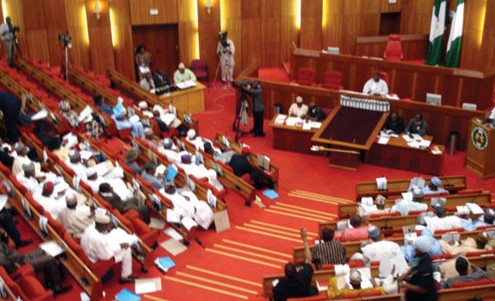Persistent governance failures are frustrating Nigeria’s efforts to mobilise development finance despite recent economic reforms, according to the 2025 Nigeria Country Focus Report, newly released by the African Development Bank.
The report, launched in Abuja on Thursday and titled “Making Nigeria’s Capital Work Better for Its Development”, paints a bleak picture of Nigeria’s ability to attract and effectively use domestic resources to fund national development.
Specifically, in a statement issued by the Bank, after the launch, the report projects that Nigeria’s real Gross Domestic Product growth will moderate to 3.2 per cent in 2025 and 3.1 per cent in 2026, down from 3.4 per cent in 2024.
The slowdown, it said, would stem largely from “persistent structural bottlenecks and heightened global uncertainty.”
Also, it noted that fragmented regulatory oversight, overlapping institutional mandates, and limited coordination among government bodies have continued to erode public trust and discourage investment.
“Governance and institutional shortfalls further complicate the domestic resource mobilisation landscape, impeding Nigeria’s ability to capitalise on its wealth.
“Fragmented regulatory oversight, overlapping jurisdictions between federal and subnational entities, and pervasive corruption have eroded public trust and discouraged both domestic and foreign investment.
“These constraints not only widen the development finance gap but also stunt the broader economic transformation process. Tackling them requires a strategic overhaul — streamlining administrative processes, enforcing robust anti-corruption measures, developing digital infrastructure, and reinforcing the rule of law,” the report said.
The findings come at a time when Nigeria is pursuing bold policy changes, including fuel subsidy removal, exchange rate unification and tax restructuring.
However, the report warns that without strong institutions and governance frameworks, these reforms risk losing momentum.
Nigeria is currently facing an annual development financing gap of $31.5bn if it is to meet its Sustainable Development Goals by 2030.
While recent tax reforms have led to modest revenue growth, the country’s tax-to-GDP ratio remains among the lowest in the region, estimated at around 13 per cent.
This, according to the report, reflects a large informal economy, weak tax compliance, and inefficiencies in public finance administration.
The report also raised concerns about Nigeria’s declining natural capital and underinvestment in human capital development.
It noted that Nigeria’s natural capital—such as forests, agricultural land, and renewable resources—makes up over 37 per cent of its capital wealth, but is depleting rapidly.
Since 1999, per capita natural capital has declined at an average of 2.1 per cent annually. Meanwhile, Nigeria’s Human Capital Index remains low at 36 per cent, with federal spending on education and health considered inadequate for long-term productivity growth.
Education accounted for just 7.9 per cent of the 2024 budget, while health took up 5.3 per cent.
The African Development Bank said Nigeria must increase public investment in health and education, reform curricula to meet market demands and improve technical and vocational training systems in order to raise productivity and reduce inequality.
It further called on the country to improve domestic resource mobilisation through stronger institutions, better tax compliance, and transparent management of public funds.
The report also highlighted the importance of innovative financing, such as diaspora bonds, blended finance, and green bonds, in bridging the development financing gap.
It noted that Nigeria’s emerging carbon market could potentially generate up to $2bn in new revenue if properly developed and governed.
READ ALSO:Oil Set For Weekly Loss, Dollar Weakens On Threat To Fed Independence, Fading Mideast Risks
Commenting on the significance of the report, Director General for Nigeria at the African Development Bank, Dr Abdul Kamara, said, “This report is both timely and practical. Nigeria is demonstrating bold leadership through difficult but necessary reforms. Its capital is more than financial; it includes human, natural, and institutional assets. What this report shows is the need for integrated strategies that make every form of capital work together to drive inclusive and sustainable transformation.”
The report was officially launched on behalf of the Federal Government by the Head of Fiscal and Tax Reforms Implementation Division at the Federal Inland Revenue Service, Mr Olufemi Olarinde.
Speaking at the event, Olarinde said, “We appreciate the efforts of the African Development Bank in contributing to this important report, which reflects our ongoing work in fiscal and tax reforms. It accurately captures both the strides we are making and the challenges we face as we strengthen Nigeria’s public finance system.”
Also speaking, the Bank’s Lead Economist for West Africa, Jacob Oduor, noted that while policy instruments such as market-based exchange rate systems have the potential to bolster Nigeria’s economic resilience, their effectiveness depends on the presence of credible institutions and sound macroeconomic discipline.
Reinforcing this position, Country Economist for Nigeria, Peter Rasmussen, said, “Nigeria’s commitment to fiscal reform is crucial to building a resilient economy. The CFR reveals that strengthening non-oil revenue and improving public financial management will not only reduce reliance on volatile oil markets but also provide the fiscal space needed to invest in people and infrastructure.”
The CFR’s findings also echoed private sector concerns, with the Head of Research and Development at the Nigeria Economic Summit Group, Joseph Ogebe, stating that the report aligns with NESG’s position.
He said, “Price stability remains a pressing concern, with inflation disproportionately affecting micro and medium-sized businesses. We continue to advocate for a productivity-led deflation strategy and recommend a growth with depth approach that prioritises sustainable economic expansion over reliance on borrowing.”
The 2025 Nigeria Country Focus Report is part of the Bank’s annual country-level analytical series, aligned with the African Economic Outlook.
It offers evidence-based insights tailored to national priorities and supports reform implementation, policy dialogue, and development planning in its regional member countries.












